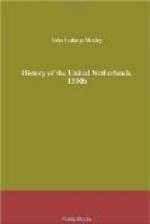But the divine right of kings, associating itself with the power supreme of the Church, was struggling to maintain that old mastery of mankind which awakening reason was inclined to dispute. Countries and nations being regarded as private property to be inherited or bequeathed by a few favoured individuals—provided always that those individuals were obedient to the chief-priest—it had now become right and proper for the Spanish monarch to annex Scotland, England, and France to the very considerable possessions which were already his own. Scotland he claimed by virtue of the expressed wish of Mary to the exclusion of her heretic son.
France, which had been unjustly usurped by another family in times past to his detriment, and which only a mere human invention—a “pleasantry” as Alva had happily termed it, called the “Salic law”—prevented from passing quietly to his daughter, as heiress to her mother, daughter of Henry II., he was now fully bent upon making his own without further loss of time. England, in consequence of the mishap of the year eighty-eight, he was inclined to defer appropriating until the possession of the French coasts, together with those of the Netherlands, should enable him to risk the adventure with assured chances of success.
The Netherlands were fast slipping beyond his control, to be sure, as he engaged in these endless schemes; and ill-disposed people of the day said that the king was like Aesop’s dog, lapping the river dry in order to get at the skins floating on the surface. The Duke of Parma was driven to his wits’ ends for expedients, and beside himself with vexation, when commanded to withdraw his ill-paid and mutinous army from the Provinces for the purpose of invading France. Most importunate were the appeals and potent the arguments by which he attempted to turn Philip from his purpose. It was in vain. Spain was the great, aggressive, overshadowing power at that day, before whose plots and whose violence the nations alternately trembled, and it was France that now stood in danger of being conquered or dismembered by the common enemy of all. That unhappy kingdom, torn by intestine conflict, naturally invited the ambition and the greediness of foreign powers. Civil war had been its condition, with brief intervals, for a whole generation of mankind. During the last few years, the sword had been never sheathed, while “the holy Confederacy” and the Bearnese




